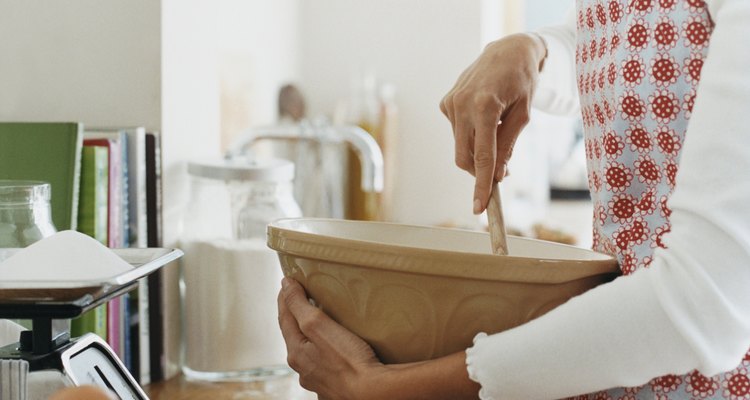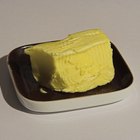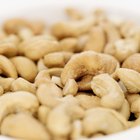
Digital Vision./Digital Vision/Getty Images
The versatility of butter lends it an important place in the kitchen, but the matter of how to store the ingredient depends on several factors. While butter is largely free of water, helping to inhibit growth of bacteria, it can turn rancid quickly if improperly stored. Choose how to store your butter based on how soft you require the ingredient to be and the length of time for which you intend to store it.
Room Temperature Storage
Butter is generally made with pasteurized milk and contains very little water, both conditions that lend to lower chances of bacteria growth. The addition of salt, a preserving agent, in salted butter makes the variety even more stable. While the official USDA opinion on butter is that it should be kept refrigerated at all times, in practice, butter may be stored at room temperature for up to a few days. Keep the butter out of bright light, away from strong odors and with minimal exposure to the air. Butter may also be brought to room temperature for baking or everyday usage on the counter, in its wrapper, for 10 to 45 minutes.
Chilled Storage
The ideal storage for butter is a cold, dark environment, where it will remain below the temperature danger zone and away from light and air exposure. When kept in a refrigerator set below 40 degrees Fahrenheit, butter may be stored for up to two weeks. This may contradict the expiration date on the butter's packaging, but is the ideal length for maintaining freshness. Any opened sticks of butter must be properly wrapped to minimize exposure to stale air and absorption of odors from the refrigerator.
Long-Term Storage
Store any butter that will not be used within two weeks in your freezer. Properly wrapped butter will keep in a freezer held at or below 0 degree for six to nine months, providing the opportunity to store butter reserves without worry of running out or losing freshness. Thaw the butter in the refrigerator, then bring to room temperature as needed.
Packaging Butter for Storage
Consider using a butter bell, also known as a French butter keeper, to store butter at room temperature. The container stores butter in a cup, held in cool water, to prevent air from reaching the butter and causing rancidity. Otherwise, keep the butter covered in its original wrapping or in a covered butter dish, on a counter away from direct light.
Store unopened butter in the refrigerator in its original packaging. Once opened, wrap the stick in plastic wrap or a sandwich bag, or store in a covered butter dish.
Wrap butter in moisture-proof freezer packaging, such as zippered freezer bags, over the original carton for an extra layer of protection. To store smaller sections, divide the butter as desired and wrap with a layer of parchment paper, followed by a layer of plastic wrap and finally a freezer bag.
Do not wrap butter in aluminum foil, as the contact with metal can hasten fat oxidation and cause the butter to turn rancid.
When Butter Goes Bad
Air and bright light break the fat molecules in butter into smaller fragments, causing the butter to smell and taste rancid. Because of its delicate flavor, butter also absorbs strong odors from other food and the environment. If the butter smells or tastes off, discard it. When you see dark yellow, translucent patches on a stick of butter, this indicates an area where the butter has dried out due to air exposure. Cut off any spots such as this, as they will taste rancid.
Related Articles
How Long Can You Keep Butter ...
How Long Can Unsalted Butter Go ...

How to Use Butter Powder

How to Quickly Thaw Butter

How to Store Ghee

What Is the Highest Quality Butter for ...

Is Homemade Butter Better Than ...

Adding Cold Water to Whipped Butter

How Can I Soften Frozen Butter for ...

How to Cook Butter Peas

What Is the Difference Between Coconut ...

Should You Refrigerate Homemade Nut ...

Calories in Butter Beans

What Can I Substitute for Butter When ...

Vegan Alternatives to Lanolin in ...

Is Cashew Butter Healthy?

How is a Butter Mold Used?

How to Make Black Butter

What Is the Benefit of Olive Butter for ...

Substitutes for Butter When Baking ...
References
- On Food and Cooking: The Science and Lore of the Kitchen; Harold McGee
- Clemson Cooperative Extension: Safe Handling of Milk & Dairy Products
- Boston Globe: Ask Martha - Keeping Butter from Contamination
- The Kitchn: Good Question - How Long Can I Leave Butter Out?
Resources
Writer Bio
Kathryn Roberts has worked in the culinary industry for nearly a decade in various roles, including pastry chef and bakery manager. After studying at the Culinary Institute of America, she earned her BFA from Goddard College and is pursing an MFA in Writing from Vermont College of Fine Arts.
Photo Credits
Digital Vision./Digital Vision/Getty Images